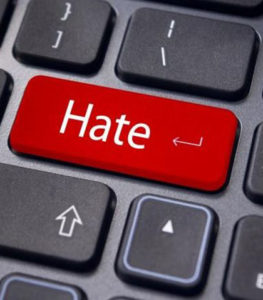Are internet search engines driving hate and xenophobia?
A Google search of ‘Multiculturalism’ from an Australian location yields the words ‘bad’, ‘a disaster’ and ‘cancer’ as the top three associated suggestions.
These disturbing revelations come from the work of researchers looking at the activities of white supremacist groups online.
 Macquarie University researcher Kawsar Ali is investigating the links between race, power and the Internet, as part of her Master’s Degree. As part of her work, Ms Ali has coined the phrase ‘digital settler colonialism’ online and offline.
Macquarie University researcher Kawsar Ali is investigating the links between race, power and the Internet, as part of her Master’s Degree. As part of her work, Ms Ali has coined the phrase ‘digital settler colonialism’ online and offline.
Her interest in this area was sparked by the Christchurch Massacre, in which an Australian with links to the far right murdered 51 Muslims and injured 49 more in two gun rampages at mosques in the city.
The killer livestreamed the slaughter on social media, and also posted a ‘manifesto’ online prior to the shooting. It’s been banned in New Zealand, but Ms Ali says that many of broad the themes in Tarrant’s writing are now suggested searches from Google, one of the world’s largest online companies.
Google search results and suggestions are based on a frequently changing algorithm which the company keeps as a closely guarded secret. However, it is believed to be heavily reliant on what a large mass of people in a particular region are searching for or reacting to.
Ms Ali wrote an essay to mark the one year anniversary of the massacre.
“One day I sat in the postgraduate research space at my university. I wanted to see what happened when I typed in terms that used race related terms, like ‘multiculturalism’, ‘xenophobia’ and ‘minorities’,” Ms Ali wrote.
“I wondered, would this search engine pose as hostile architecture after the Christchurch shooting? What I found left me at a loss for words.”
“Suggested results like “multiculturalism is cancer” and “multiculturalism is a disaster” mimicked lines you would find at a white supremacist rally, in alt-right literature or memed into fame on 4chan or 8chan,” Ms Ali wrote.
“They reminded me of a passage in the Christchurch killer’s manifesto: ‘Your ancestors did not sweat, bleed and die in the name of a multicultural, egalitarian nation. They built homes for their children to live in, they built communities for their people to thrive in, they built nations for their people to survive in.’”
“I decided to ask questions such as, ‘How can the Internet be used to extend settler colonialism?’ And ‘What does the Christchurch shooting say about Australia and Aotearoa?’” Ms Ali wrote.
“My research reveals that that academic studies of the alt-right, online communities and white supremacy have largely focused on a growing online presence across social media and websites such as Twitter, Reddit and 4chan and 8chan.
“The ability of online users to surpass national boundaries and spread global white supremacy through the Internet has also been studied. The alt-right have found a home on the Internet, using its features to cunningly recruit members, form a growing community and mainstream politically extreme views,” she said.
Ms Ali said that while there is little literature that discusses the Christchurch shooting and settler colonialism, there is a wealth of reporting about the Internet, white supremacy and racial violence.
“This area of growing knowledge shows that those studying the links between race, power and the Internet have been able to produce strong literature regarding the alt-right, online communities and white supremacy despite the online anonymity of majority of its members,” she said.
“Every piece of online data is different, all of them disturbing at some level, and of course, open to various interpretations. I find different types of information every day to interrogate this research. For example, much can be said about Australia, the Internet and settler colonialism given the fact that online users of 4chan continually nominated the Christchurch killer as ‘Australian of the Year’ and ‘Local Hero’ in the annual award ceremony.
“Citing reference to his manifesto and supplying the Christchurch High Court as a contact (the body in charge of the Royal Inquiry into the Christchurch Mosque Shootings), the users encouraged nominations across threads on the site,” Ms Ali said.
See the full essay here: https://newmatilda.com/2020/03/15/one-year-on-a-search-for-meaning-from-the-christchurch-massacre/












